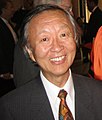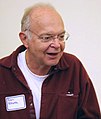InternetArchiveBot (talk | contribs) Rescuing 2 sources and tagging 0 as dead.) #IABot (v2.0.9.3 |
Scope creep (talk | contribs) copyedit. Its a bit fluffy. De-fluffed |
||
| (One intermediate revision by one other user not shown) | |||
| Line 22: | Line 22: | ||
}} |
}} |
||
The '''Faraday Medal''' is a top international medal awarded by the UK [[Institution of Engineering and Technology]] (IET) (previously called the [[Institution of Electrical Engineers]] (IEE)).<ref>[http://www.theiet.org/about/libarc/archives/institution-history/faraday-winners.cfm IET Archives] {{webarchive |url=https://web.archive.org/web/20071201132517/http://www.theiet.org/about/libarc/archives/institution-history/faraday-winners.cfm |date=December 1, 2007 }}</ref><ref>[http://www.oxforddnb.com/templates/theme-print.jsp?articleid=93187 Oxford DNB thematic list]</ref><ref>{{cite web|archiveurl=https://web.archive.org/web/20151117015111/http://conferences.theiet.org/achievement/awards/medals/faraday.cfm|archivedate=2015-11-17|url=http://conferences.theiet.org/achievement/awards/medals/faraday.cfm|publisher=theiet.org|location=London|title=IET Awards – Faraday Medal: Awards, prizes and scholarships within engineering and technology}}</ref> It is part of the [[IET Achievement Medals]] collection of awards.<ref>{{cite web|url=http://conferences.theiet.org/achievement/awards/medals/achieve-medals.cfm|title=IET Achievement Medals}}</ref> The medal is named after the |
The '''Faraday Medal''' is a top international medal awarded by the UK [[Institution of Engineering and Technology]] (IET) (previously called the [[Institution of Electrical Engineers]] (IEE)).<ref>[http://www.theiet.org/about/libarc/archives/institution-history/faraday-winners.cfm IET Archives] {{webarchive |url=https://web.archive.org/web/20071201132517/http://www.theiet.org/about/libarc/archives/institution-history/faraday-winners.cfm |date=December 1, 2007 }}</ref><ref>[http://www.oxforddnb.com/templates/theme-print.jsp?articleid=93187 Oxford DNB thematic list]</ref><ref>{{cite web|archiveurl=https://web.archive.org/web/20151117015111/http://conferences.theiet.org/achievement/awards/medals/faraday.cfm|archivedate=2015-11-17|url=http://conferences.theiet.org/achievement/awards/medals/faraday.cfm|publisher=theiet.org|location=London|title=IET Awards – Faraday Medal: Awards, prizes and scholarships within engineering and technology}}</ref> It is part of the [[IET Achievement Medals]] collection of awards.<ref>{{cite web|url=http://conferences.theiet.org/achievement/awards/medals/achieve-medals.cfm|title=IET Achievement Medals}}</ref> The medal is named after the British physicist [[Michael Faraday]], the father of electromagnetism. |
||
==Background== |
==Background== |
||
| Line 155: | Line 155: | ||
*2020 [[Bashir Al-Hashimi]]<ref>{{Cite web|title=Our IET 2020 Prestige Medal winners|url=https://www.theiet.org/impact-society/awards-scholarships/achievement-awards/achievement-medals/our-iet-2020-prestige-medal-winners/|access-date=27 February 2021|publisher=[[Institution of Engineering and Technology]]|language=en-US|archive-date=10 April 2021|archive-url=https://web.archive.org/web/20210410121022/https://www.theiet.org/impact-society/awards-scholarships/achievement-awards/achievement-medals/our-iet-2020-prestige-medal-winners/|url-status=dead}}</ref> |
*2020 [[Bashir Al-Hashimi]]<ref>{{Cite web|title=Our IET 2020 Prestige Medal winners|url=https://www.theiet.org/impact-society/awards-scholarships/achievement-awards/achievement-medals/our-iet-2020-prestige-medal-winners/|access-date=27 February 2021|publisher=[[Institution of Engineering and Technology]]|language=en-US|archive-date=10 April 2021|archive-url=https://web.archive.org/web/20210410121022/https://www.theiet.org/impact-society/awards-scholarships/achievement-awards/achievement-medals/our-iet-2020-prestige-medal-winners/|url-status=dead}}</ref> |
||
*2021 [[John E E Fleming]]<ref>{{Cite web|title=Our IET 2021 Prestige Medal winners|url=https://www.theiet.org/impact-society/awards-scholarships/achievement-awards/achievement-medals/iet-achievement-medals-2021-winners/|publisher=[[Institution of Engineering and Technology]]|language=en-US}}</ref> |
*2021 [[John E E Fleming]]<ref>{{Cite web|title=Our IET 2021 Prestige Medal winners|url=https://www.theiet.org/impact-society/awards-scholarships/achievement-awards/achievement-medals/iet-achievement-medals-2021-winners/|publisher=[[Institution of Engineering and Technology]]|language=en-US}}</ref> |
||
*2023 [[Arogyaswami Paulraj]] |
|||
{{div col end}} |
{{div col end}} |
||
}} |
}} |
||
Latest revision as of 16:52, 22 March 2024
| IET Faraday Medal | |
|---|---|
 | |
| Awarded for | Awarded either for notable scientific or industrial achievement in engineering or for conspicuous service rendered to the advancement of science, engineering and technology or for lifetime achievement in science, engineering or technology. |
| Sponsored by | Institution of Engineering and Technology and the Institution of Electrical Engineers |
| Date | Since 1922 |
| Country | |
| Website | conferences |
The Faraday Medal is a top international medal awarded by the UK Institution of Engineering and Technology (IET) (previously called the Institution of Electrical Engineers (IEE)).[1][2][3] It is part of the IET Achievement Medals collection of awards.[4] The medal is named after the British physicist Michael Faraday, the father of electromagnetism.
Background[edit]
The Faraday medal is the IET's highest honour and one of the world's most prestigious awards for engineers and scientists. Winners include ground-breaking pioneers and inventors. First awarded in 1922, it is one of the oldest medals still being awarded today. The top medal is awarded annually to distinguished individuals who either for notable scientific or industrial achievement in engineering or for conspicuous service rendered to the advancement of science, engineering and technology, without restriction as regards to nationality, country of residence or membership of the Institution. The award was established in 1922 to commemorate the 50th Anniversary of the first Ordinary Meeting of the Society of Telegraph Engineers and is named after Michael Faraday. Each year, the recipient received his/her award at a ceremony held in London that is hosted by the IET.[5]
Winners[edit]

Reverse side
-
Heaviside: Transmission line theory, H-step function, 1922
-
Parsons: Invented the modern steam turbine, 1923
-
Thomson: Discovered electrons, 1925
-
Fleming: Invented vacuum tubes, 1928
-
Rutherford: Discovered the atomic nucleus, 1930
-
Appleton: Discovered the Appleton layer, 1946
-
Cockcroft: "Split" the atomic nucleus, 1955
-
Zworykin involved with inventing television and electron microscope, 1965
-
Wilkes: Built the first electronic computer, 1981
-
Kao: Pioneered the development and use of fibre optics, 1989
-
Knuth: Art of computer programming, 2011
-
Immink: Digital video and audio recording, 2015
-
Stroustrup: Created C++, 2017
First 50 Years (1922–1972)[edit]
- 1922 Oliver Heaviside
- 1923 The Hon Sir Charles Algernon Parsons
- 1924 Sebastian Ziani de Ferranti
- 1925 Sir Joseph John Thomson
- 1926 Rookes Evelyn Bell Crompton
- 1927 Elihu Thomson
- 1928 Sir Ambrose Fleming
- 1929 Guido Semenza
- 1930 Sir Ernest Rutherford
- 1931 Charles Hesterman Merz
- 1932 Sir Oliver Lodge
- 1933 no award
- 1934 Sir Frank Edward Smith
- 1935 Frank Baldwin Jewett
- 1936 Sir William Henry Bragg
- 1937 André Blondel
- 1938 Sir John Francis Cleverton Snell
- 1939 William David Coolidge
- 1940 Alexander Russell
- 1941 Sir Arthur Percy Morris Fleming
- 1942 Pyotr Kapitsa
- 1943 Sir Archibald Page
- 1944 Irving Langmuir
- 1945 Sir Clifford Copland Paterson
- 1946 Sir Edward Victor Appleton
- 1947 Sir Leonard Pearce
- 1948 Mark Oliphant
- 1949 Charles Samuel Franklin
- 1950 Sir James Chadwick
- 1951 Thomas Eckersley
- 1952 Ernest Lawrence
- 1953 Sir Arthur Stanley Angwin
- 1954 Sir Isaac Shoenberg
- 1955 Sir John Cockcroft
- 1956 G W O Howe
- 1957 Waldemar Borgquist
- 1958 Sir Gordon Radley
- 1959 Luigi Emanueli
- 1960 Sir George Paget Thomson
- 1961 Julius Adams Stratton
- 1962 Sir Basil Schonland
- 1963 Pierre Marie Jean Ailleret
- 1964 Joseph Ronald Mortlock
- 1965 Vladimir Zworykin
- 1966 J A Ratcliffe
- 1967 H E M Barlow
- 1968 Leslie Herbert Bedford
- 1969 Philip Sporn
- 1970 Charles William Oatley
- 1971 Sir Martin Ryle
- 1972 F C Williams
Next 50 Years (1973–2023)[edit]
- 1973 Sir Nevill Mott
- 1974 George Millington
- 1975 John Millar Meek
- 1976 Thomas Otten Paine
- 1977 John Bertram Adams
- 1978 Erich Friedlander
- 1979 Robert Noyce
- 1980 Eric Ash
- 1981 Sir Maurice Wilkes
- 1982 Brian David Josephson
- 1983 William Alexander Gambling
- 1984 Alexander Lamb Cullen
- 1985 Sir Charles Antony Richard Hoare
- 1986 Edwin Douglas Ramsay Shearman
- 1987 Sir David Evan Naunton Davies
- 1988 Cyril Hilsum
- 1989 Charles Kuen Kao
- 1990 Peter Lawrenson
- 1991 Alan Rudge
- 1992 Laszlo Solymar
- 1993 Alistair George James MacFarlane
- 1994 John Parnaby
- 1995 David Rhodes
- 1996 Stewart Crichton Miller
- 1997 John Edwin Midwinter
- 1998 Roger Needham
- 1999 Patrick Arthur McKeown
- 2000 J. Michael Brady[6]
- 2001 Chris Harris
- 2002 Sir Robin Saxby[7]
- 2003 Sir Richard Friend[8]
- 2004 Peter Mitchell Grant[9]
- 2005 Azim Premji
- 2006 John McCanny[10]
- 2007 Steve Furber[11]
- 2008 Josef Kittler[12]
- 2009 Sir Martin Sweeting
- 2010 Donal Bradley
- 2011 Donald Knuth[13]
- 2012 Leonardo Chiariglione
- 2013 Sir Michael Pepper[14]
- 2014 Christofer Toumazou[15]
- 2015 Kees Schouhamer Immink
- 2016 Andy Harter[16]
- 2017 Bjarne Stroustrup[17]
- 2018 - not awarded
- 2019 Sir Peter Knight
- 2020 Bashir Al-Hashimi[18]
- 2021 John E E Fleming[19]
- 2023 Arogyaswami Paulraj
See also[edit]
- Queen Elizabeth Prize for Engineering
- Millennium Technology Prize
- IEEE Medal of Honor
- Turing Award
- Nobel Prize
References[edit]
- ^ IET Archives Archived December 1, 2007, at the Wayback Machine
- ^ Oxford DNB thematic list
- ^ "IET Awards – Faraday Medal: Awards, prizes and scholarships within engineering and technology". London: theiet.org. Archived from the original on 17 November 2015.
- ^ "IET Achievement Medals".
- ^ "IET Awards ceremony".
- ^ "Sir Michael Brady, University of Oxford, UK".
- ^ "Sir Robin Saxby awarded 2002 Faraday Medal, 2002".
- ^ "Sir Richard Friend, University of Cambridge, UK". 23 July 2013.
- ^ "Professor wins IEE's highest accolade, 2004". 26 March 2004.
- ^ "DSP pioneer awarded Faraday Medal, 2006".
- ^ "PC revolutionary honoured". 18 September 2007.
- ^ "Professor Josef Kittler, University of Surrey, UK".
- ^ IET: Professor Donald Knuth to be awarded prestigious Faraday Medal, Politics.co.uk Archived 2 March 2020 at the Wayback Machine, retrieved 16 May 2016.
- ^ "Sir Mike Pepper winner of IET Faraday Medal 2013".
- ^ "Imperial researcher wins Institution of Engineering and Technology's top honour".
- ^ "Alumnus awarded Faraday medal, Fitzwilliam College Cambridge".
- ^ "Bjarne Stroustrup awarded 2017 Faraday Medal".
- ^ "Our IET 2020 Prestige Medal winners". Institution of Engineering and Technology. Archived from the original on 10 April 2021. Retrieved 27 February 2021.
- ^ "Our IET 2021 Prestige Medal winners". Institution of Engineering and Technology.












